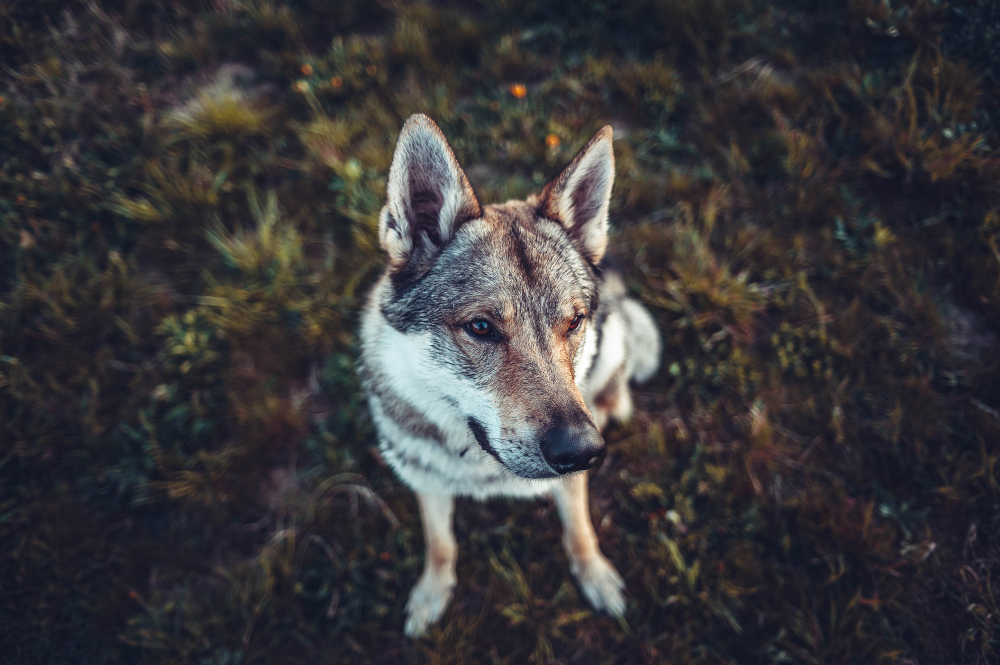German Shepherd Husky mixes (Shepskies) are one of the most interesting dog breeds out there. They combine the appearance, intelligence, and working instincts of two powerful breeds in one adorable package. As a result, they tend to have an abundance of energy and a high prey drive. With that in mind, you might be wondering how long a German Shepherd Husky mix will live.
German Shepherd Husky mixes (also known as Gerberian Shepskies) have a typical lifespan of 7–14 years. As a mixed breed, they can inherit “hybrid vigor,” which means they may have fewer genetic health problems than their purebred parents. In this case, it is possible that they can live to be nearly 20 years old.
To help owners stay on top of their dog’s health, we outline how long the average Shepskies live and the common health risks they face. We also consulted the American Animal Health Association (AAHA) for advice on keeping our Shepskies healthy.
More on German Shepherd Husky Mix: A Designer Breed You Can’t Miss

- A Designer Breed: German Shepherd Husky Mix (Gerberian Shepsky)?
- How Big Do German Shepherd Husky Mix Puppies Get?
- How Smart Are German Shepherd Husky Mixes?
- Are German Shepherd Husky Mixes Easy to Train?
- Are German Shepherd Husky Mixes Good with Cats?
- How Cold is Too Cold for a German Shepherd Husky Mix?
- Can Shepskies Live Outside by Themselves?
- Can a Shepsky Live in an Apartment?
- What is the Lifespan of a German Shepherd Husky Mix?
- How Much Does a German Shepherd Husky Mix Cost?
You may also like:
How long does it take for a German Shepherd Husky mix to grow up?
It can also take up to 3 years for them to become emotionally mature and settle down into adulthood.
After the first stage of puppyhood, a Shepsky becomes a juvenile from 3 to 6 months old.
After that, they are teenagers until about 2 years. Even though they may become sexually mature between about 8 months and a year, they only reach their full adult size between 18 months and 3 years.
When they turn 7 or 8, a German Shepherd Husky mix typically becomes a senior and enters its golden years.
| A dog’s life stages | Age |
| Puppyhood | 0 to 12 weeks old |
| Juvenile | 3 to 6 months old |
| Teenager | 6 to 12 months old |
| Adolescence | 12 to 18 months old |
| Adult | 2-3 years old to 7 years old |
| Senior | 7-8 years old up |
This video shows how much a Shepsky grows from 9 weeks to a year:
How do we know how long the Shepsky lives?
That said, a Shepsky’s lifespan can be somewhere from 7 to 14 years, if not longer. We can estimate their longevity based on how long their parent breeds, the German Shepherd and Husky live.
| The average lifespan of German Shepherds | The average lifespan of Siberian Huskies |
| 9.73 years | 12–15 years |
According to research from Cell Reports, the average lifespan of Germans Shepherds is 9.73 years. Husky expert Lyn Sirota believes Huskies live 12–15 years.
Sadly, their lives can be cut short drastically.
As David Grimm, the editor of science.org, explains in his post Why we outlive our pets, “Big dogs do tend to have more health problems than small ones – German Shepherds are prone to hip dysplasia, for example, and Siberian Huskies are plagued by autoimmune disorders….”
What do the German Shepherd Husky mixes usually die from?
To understand the health risks our Shepskies face and them live longer, happier life, we need to look at what dangers they face. This way, we can be proactive about our dog’s health.
So let’s look at the most common Husky health risks and at Dr. Vilson’s study on German Shepherd deaths to know what Shepsky owners should beware of. After all, the Shepsky will likely inherit many of the same hazards.
#1 Many Shepskies die from accidents
A major danger to German Shepherd Husky mixes is getting into accidents. These dogs love to escape their yard and go on adventures, and most of them love chasing small animals. So they are especially at risk of car accidents because of how often they run into the road.
#2 Cancer is the leading medical cause of death for adult Shepskies
As Shepskies get older, they become vulnerable to cancer. One of the more common types is called hemangiosarcoma. This is one of the most common kinds of cancer in German Shepherds and Huskies, and they can pass it on to Shepsky.
#3 Shepsky puppies are most at risk of infectious disease
Like all breeds, the most dangerous threat to young Shepskies is infectious diseases like parvovirus and canine distemper. A Shepsky puppy does not have a fully developed immune system, and we must take precautions to protect them from these deadly diseases.
#4 Parasites are a threat to Shepskies’ life
A final danger to Shepskies is also common to all dogs. Whether it’s worms, ticks, fleas, or mites, parasites can be deadly to Shepskies. These parasites either steal important nutrients from our dogs or carry severe diseases like Lyme disease.
Common health issues in German Shepherd Husky mixes
Not all health risks a Shepsky may face are immediately deadly, but they could affect your dog’s quality of life. Some conditions are also progressive, which means they become worse as your dog gets older.
Progressive or degenerative diseases can gradually affect your dog’s ability to see or walk. Hormonal or conditions that affect the immune system can have complications.
These problems will need constant management, and you may need to work closely with your veterinarian to ensure your Shepsky lives as and as comfortably as possible if they one of these issues.
#1 Joint & bone problems
Like most large breeds, Gerberian Shepskies are prone to degenerative joint disorders. This means they can inherit bone and joint problems that worsen with age, such as hip dysplasia. It can even affect the bones and nerves in the spine in cases of stenosis or myelopathy.
#2 Immune or hormonal disorders
Shepskies may inherit a number of immune or hormonal problems from their parent breeds. The biggest problem is allergies which could lead to chronic ear and skin infections. But they may also suffer from conditions like:
- Pemphigus
- Lupus
- Exocrine pancreatic atrophy (EPA)
- Diabetes
- Circumanal fistulae
- Uveodermatologic syndrome (the immune system attacks the cells that pigment in the eyes and skin)
- Hypothyroidism
#3 Skin conditions
Shepskies can develop some skin problems that can be difficult to manage and may affect their quality of life. While growing, they may have either type 1 or type 2 zinc deficiencies that will affect their skin and coat. Their tendency toward allergies can also mean they develop many yeast and bacterial infections from excessive scratching.
#4 Eye problems
The German Shepherd Husky mix sometimes inherits problems such as progressive retinal atrophy (PRA), glaucoma, or corneal dystrophy. They may inherit these from the Husky side. But some eye diseases, like Pannus, are most common in GSDs, and this can also affect the Shepsky.
Nine ways to make my German Shepherd Husky Mix live longer
Whether it’s a big dog or a small dog, all dogs come with their own set of health issues. The good news is, there are things you can do to make them healthier. AAHA has set forth some guidelines that can help better take care of our German Shepherd Husky mixes, so they can live well. Here’s the list:
#1 Give your Shepsky the best diet
Good nutrition is the best place to start helping our dogs live longer. High-quality, less-processed food is the best way to ensure our Shepsky’s thrive.
However, it’s essential to keep their diets balanced professionally, as nutrient deficiencies and excesses can be very dangerous.
Must read: The Best & Worst Dog Foods Ever – According to a 45-Year Veterinarian
#2 Take care of your dog’s teeth
Pet parents often underestimate how much healthy teeth make a healthy dog. The plaque bacteria can spread to the rest of the organs and damage the heart, kidney, liver, and lungs. It even releases toxins that cause low levels of inflammation in the body that can contribute to conditions like diabetes (Source: Veterinary Clinics: Small Animal Practice).
Remember, Shepskies are vulnerable to diabetes, so brushing their teeth is extra important.
#3 Keep up with parasite treatments
One of the simplest ways to make sure your German Shepherd Husky mix lives a long and happy life is to deworm every 4 to 6 months. It is also vital to keep up with those tick and flea treatments.
Some treatments, like Nexguard, are monthly, while Bravecto keeps your dog safe for 3 months. Seresto collars can last between 6 and 8 months.
#4 Make sure your dog is vaccinated
Be careful not to skimp on your dog’s vaccines. A puppy should get their first vaccine at 6 weeks old and every month after that until they are about 4 months old (or according to your vet’s advice.) They will then need yearly boosters.
Also, keep young puppies away from potentially contagious areas like dog parks until they have a more developed immune system.
#5 Keep your dog secure
It may seem obvious, but it keeping your Shepksy secure at all times is critical to keeping them alive. Because this designer breed is so great at escaping the yard, and they love to chase anything that moves, it’s an extra challenge to keep them safe and out of busy roads.
So it’s important to keep Shepskies on the leash unless they are in a very securely fenced enclosure at all times.
Related: How Smart Are German Shepherd Husky Mixes?
#6 Neuter or spay your dog
The AAHA recommends that any dog not meant for breeding is neutered or spayed. They explain that, on average, sterilized dogs live longer than intact dogs. Of course, this doesn’t mean that there isn’t some controversy about spaying and neutering. So it’s important to work closely with your vet when you decide on the best time to do it and to monitor your sterilized dog as they get older.
#7 Maintain a healthy weight & exercise regime
One of the best ways to reduce your dog’s chances of disease is to keep them a healthy weight and ensure they get plenty of exercise and playtime. Overweight dogs are far more prone to all the health issues that a Shepsky may suffer, including making issues like hip dysplasia far worse. Meanwhile, exercise goes a long way in maintaining a healthy body and mind.
#8 Visit the vet regularly
See your vet for a check-up at least once a year when your Shepsky is an adult, and push it up to twice a year when they are seniors. By seeing your veterinarian regularly, you can catch any health problems early. This is the best way to eliminate issues like tumors before they become deadly.
#9 Reduce stress and anxiety
Research (on The effects of fear and anxiety on health and lifespan in pet dogs) suggests anxiety-prone dogs are more prone to health complications. Increasing your dog’s playtime and exercise can help them deal with stress and anxiety. If your dog has any anxiety issues, it’s best to speak to a professional to help your dog cope. A relaxed, calm Shepksy is far more likely to stay healthy and happy.
Conclusion
The German Shepherd Husky mix will typically live between 7 and 14 years. However, with proper care, they can live late into their teens. Although potential health problems may look daunting, just keeping our dogs on a good diet, keeping up their veterinary care, and providing plenty of healthy exercises can go a long way to having a healthy dog.
But to keep your Shepsky healthy, you may also need to know how cold is too cold for the German Shepherd Husky Mix.










